1881 Benjamin Disraeli “Dizzy” earl of Beaconsfield,
Viscount Hughenden of Hughenden, born on 21 December 1804 in England
to a Jewish family of Italian origin. But, at the age when he would have
been expected to have his Bar Mitzvah, he was baptized into the Church of
England on 31 July 1817, after his father quarreled with his synagogue (had
Benjamin remained a Jew he would have been barred from British politics).
British statesman and novelist who was the favorite prime minister of Queen
Victoria (twice: 1868, 1874-80) implacable adversary of the Liberal party
leader William E. Gladstone (29 Dec 1809 – 19 May 1898) [whom
Disraeli would have been glad to see turned to stone]. Disraeli provided
the Conservative Party with a twofold policy of Tory democracy and imperialism.
— DISRAELI ONLINE: Sybil,
or, The Two Nations
1881 Karl
Mikhailovich Peterson, Russian mathematician born on 25 May
1828. His main work was in differential geometry.
1870 Andreas
Schelfout, Dutch artist born on 16 February 1787.
1861:
4 soldiers, 9 civilians, in Baltimore riots, first
victims of US Civil War.
The
first blood of the US Civil War is shed when a secessionist mob in
Baltimore attacks Massachusetts troops bound for Washington DC. Four
soldiers and 12 rioters were killed. One week earlier, on 12 April,
the Civil War began when Confederate shore batteries opened fire on
Union-held Fort Sumter in South Carolina's Charleston Bay. During
a 34-hour period, 50 Confederate guns and mortars launched more than
4000 rounds at the poorly supplied fort. The fort's garrison returned
fire, but lacking men, ammunition, and food, it was forced to surrender
on 13 April. There were no casualties in the fighting, but one
federal soldier was killed the next day when a store of gunpowder
was accidentally ignited during the firing of the final surrender
salute. Two other federal soldiers were wounded, one mortally. On
15 April, President Abraham Lincoln issued a public proclamation
calling for 75'000 volunteer soldiers to help put down the Southern
"insurrection." Northern states responded enthusiastically to the
call, and within days the 6th Massachusetts Regiment was en route
to Washington.
On 19 April,
the troops arrive in Baltimore, Maryland, by train, disembarked, and
boarded horse-drawn cars that were to take them across the city to
where the rail line picked up again. Secessionist sympathy was strong
in Maryland, a border state where slavery was legal, and an angry
mob of secessionists gathered to confront the Yankee troops. Hoping
to prevent the regiment from reaching the railroad station, and thus
Washington, the mob blocked the carriages, and the troops were forced
to continue on foot. The mob followed close behind and then, joined
by other rioters, surrounded the regiment. Jeering turned to brick
and stone throwing, and several federal troops responded by firing
into the crowd. In the ensuing mayhem, the troops fought their way
to the train station, taking and inflicting more casualties. At the
terminal, the infantrymen were aided by Baltimore police, who held
the crowd back and allowed them to board their train and escape. Much
of their equipment was left behind. Four soldiers and 12 rioters were
killed in what is generally regarded as the first bloodshed of the
Civil War.
Maryland officials
demanded that no more federal troops be sent through the state, and
secessionists destroyed rail bridges and telegraph lines to Washington
to hinder the federal war effort. In May, Union troops occupied Baltimore,
and martial law was declared. The federal occupation of Baltimore,
and of other strategic points in Maryland, continued throughout the
war. Because western Marylanders and workingmen supported the Union,
and because federal authorities often jailed secessionist politicians,
Maryland never voted for secession. Slavery was abolished in Maryland
in 1864, the year before the Civil War's end. Eventually, more than
50'000 Marylanders fought for the Union while about 22'000 volunteered
for the Confederacy. |
1824
George Gordon, 6th Baron Byron.
^top^
He dies
in what is now Greece, where he had traveled to support the Greek
struggle for independence from Turkey. Even today, he is considered
a Greek national hero. Byron's scandalous history, exotic travels,
and flamboyant life made such an impression on the world that the
term "Byronic" was coined to mean romantic, arrogant, dark, and cynical.
Byron was born in Aberdeen, Scotland, in 1788. His clubfoot and his
impoverished environment made his childhood difficult, but at age
10 he inherited his great uncle's title. He attended Harrow, then
Trinity College, Cambridge, where he ran up enormous debts and pursued
passionate relationships with women and men. His first published volume
of poetry, Hours of Idleness (1807), was savaged by critics,
especially in Scotland, and his second published work, English
Bards and Scotch Reviewers (1809), attacked the English literary
establishment. After getting his master's degree in 1809, he traveled
in Portugal, Spain, and the Near East for two years.
His experiences fed into his later works, including Childe Harold's
Pilgrimage (1812), which brought him almost instant acclaim in
England. As he said at the time, he "awoke one morning and found myself
famous." His poetry, manners, fashion, and tastes were widely imitated.
In 1815, he married Anne Isabella Milbanke, and the couple had a daughter,
August Ada, the following year. Ada proved to be a mathematical prodigy
and is considered by some to be the first computer programmer, thanks
to her work on Charles Babbage's computing machine. The marriage quickly
foundered, and the couple legally separated. By this time, scandal
had broken out over Byron's suspected incest with his half-sister,
Augusta Leigh, and he was ostracized from society and forced to flee
England in 1816. He settled in Geneva, near Percy Bysshe Shelley and
his wife, Mary Wollstonecraft Shelley. There, he became intimately
involved with Mary's half-sister, Claire Clairmont, who bore his daughter
Allegra in January 1817. Byron moved to Venice that year and entered
a period of wild debauchery. In 1819, he began an affair with the
Countess Teresa Guiccioli, the young wife of an elderly count, and
the two remained attached for many years. Byron, always an avid supporter
of liberal causes and national independence, supported the Greek war
for independence. He joined the cause in Greece, training troops in
the town of Missolonghi, where he died just after his 36th birthday. |
1794 (30 germinal an II) BRICHE
Jean Nicolas, âgé de 77 ans, né et demeurant à Boulogne, décédé
en la maison de détention rue des Baudets, condamné à mort à Arras.
1794 (30 germinal an II) JAMMES Jean Louis, prêtre, domicilié
à Belmont, département du Cher, condamné à mort par le tribunal criminel
du département du Lot, comme réfractaire à la loi.
1793 GROLLIER
Louis, laboureur, domicilié à Longeville, département de la Vendée,
condamné à mort comme brigand de la Vendée, par la commission militaire
séante aux Sables.
1793 MARTINEAU François, journalier,
domicilié à St Vincent-sur-Jarre département de la Vendée, condamné à mort
comme brigand de la Vendée, par la commission militaire des Sables.
1790 Nicolas-Jacques Juliard, French artist born in 1715. |
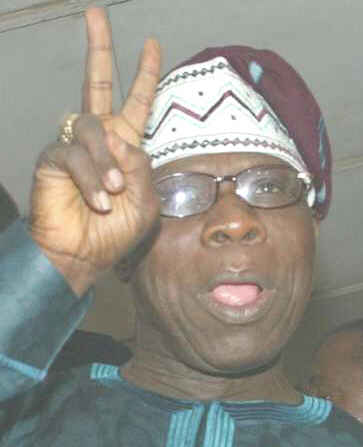 On
a 19 April:
On
a 19 April: 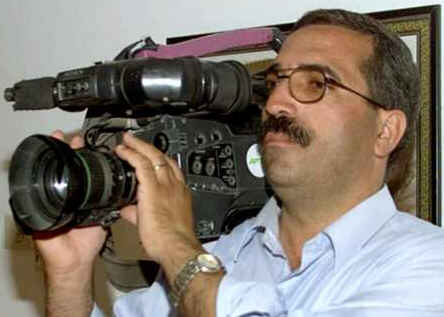 Deaths
Deaths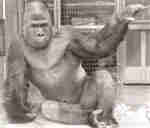
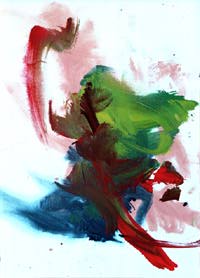
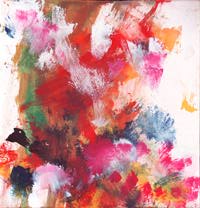
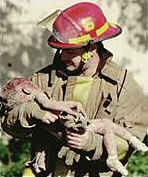 Just after 09:00 central time, a massive truck bomb explodes outside the
Alfred P. Murrah Federal Building in Oklahoma City, Oklahoma. The blast
collapsed the north face of the nine-story building, instantly killing over
a hundred people, trapping dozens more in the rubble, and injuring some
500. Emergency crews raced to Oklahoma City from across the country, and
when the rescue effort finally ended two weeks later, the death toll stood
at 168 people killed, including nineteen infants and young children who
were in the building's day care center at the time of the blast. [photo:
Baylee Almon's corpse, carried out by fireman >]
Just after 09:00 central time, a massive truck bomb explodes outside the
Alfred P. Murrah Federal Building in Oklahoma City, Oklahoma. The blast
collapsed the north face of the nine-story building, instantly killing over
a hundred people, trapping dozens more in the rubble, and injuring some
500. Emergency crews raced to Oklahoma City from across the country, and
when the rescue effort finally ended two weeks later, the death toll stood
at 168 people killed, including nineteen infants and young children who
were in the building's day care center at the time of the blast. [photo:
Baylee Almon's corpse, carried out by fireman >]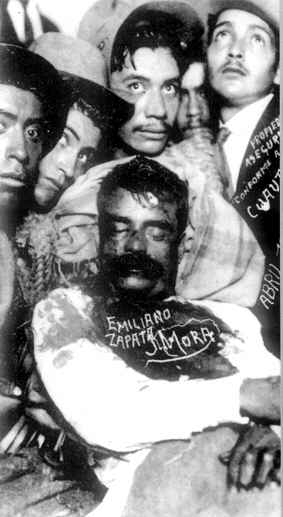 1919
1919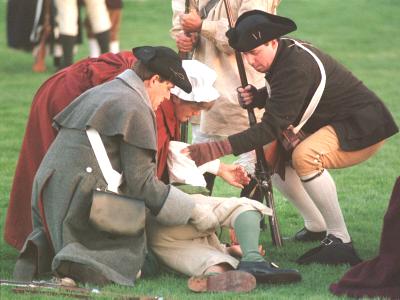 At about 05:00, several hundred British soldiers, on a mission to
capture Patriot leaders and seize a Patriot arsenal, marched into
Lexington to find about seventy armed minutemen under Captain John
Parker waiting for them on the town's common green. British Major
John Pitcairn ordered the outnumbered Patriots to disperse, and after
a moment's hesitation the Americans began to drift off the green.
Suddenly, the "shot heard around the world" was fired from an undetermined
gun, and a cloud of musket smoke soon covered the green. When the
brief Battle of Lexington ended, eight Americans lay dead or dying
and ten others were wounded. Only one British soldier was injured,
but the US War of Independence had begun. By 1775, tensions between
the American colonies and the British government had reached the breaking
point, especially in Massachusetts, where Patriot leaders formed a
shadow revolutionary government and trained militias to prepare for
armed conflict with the British troops occupying Boston.
At about 05:00, several hundred British soldiers, on a mission to
capture Patriot leaders and seize a Patriot arsenal, marched into
Lexington to find about seventy armed minutemen under Captain John
Parker waiting for them on the town's common green. British Major
John Pitcairn ordered the outnumbered Patriots to disperse, and after
a moment's hesitation the Americans began to drift off the green.
Suddenly, the "shot heard around the world" was fired from an undetermined
gun, and a cloud of musket smoke soon covered the green. When the
brief Battle of Lexington ended, eight Americans lay dead or dying
and ten others were wounded. Only one British soldier was injured,
but the US War of Independence had begun. By 1775, tensions between
the American colonies and the British government had reached the breaking
point, especially in Massachusetts, where Patriot leaders formed a
shadow revolutionary government and trained militias to prepare for
armed conflict with the British troops occupying Boston.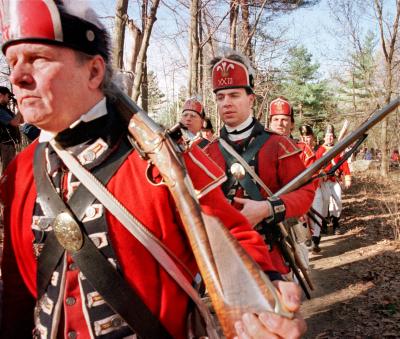 When the British troops arrived at Lexington, Adams, Hancock, and
Revere had already fled to Philadelphia, and a group of militiamen
were waiting.[photo 1: Re-enactors, playing the part of American
colonists, tend to a fallen Minuteman on the Lexington Green 000415].
The Patriots were routed within minutes, but the first shots of the
American Revolution had been fired, leading to calls to arms across
the Massachusetts countryside.
When the British troops arrived at Lexington, Adams, Hancock, and
Revere had already fled to Philadelphia, and a group of militiamen
were waiting.[photo 1: Re-enactors, playing the part of American
colonists, tend to a fallen Minuteman on the Lexington Green 000415].
The Patriots were routed within minutes, but the first shots of the
American Revolution had been fired, leading to calls to arms across
the Massachusetts countryside.